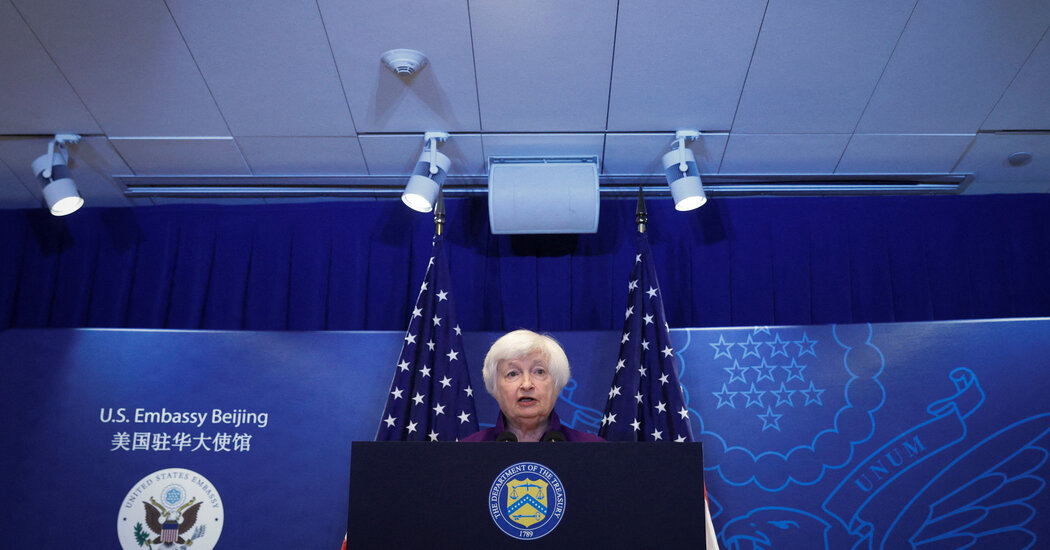The deep chill between the United States and China eased somewhat in recent days as Treasury Secretary Janet L. Yellen held marathon talks with a new group of top economic policymakers in Beijing.
Ms. Yellen used softer language for America’s economic strategy on China, rejecting a term that had caught on in Washington but offended Beijing. But while more talks are a likely result of Ms Yellen’s trip to China, neither she nor Chinese officials have backed away from their policy positions. That left the two sides facing the prospect of further conflict over trade, investment and technology.
She forged ties with China’s economic leaders.
Last fall, the Chinese Communist Party Congress cleared the way for the country’s president Xi Jinping to install a new team of loyalists in top economic positions. The officials – including Ms Yellen’s counterpart, Deputy Prime Minister He Lifeng – generally have less international experience than their predecessors and are less trusted by policymakers in the West. China has also gradually restricted the release of economic information and shut down many reports, making it more difficult to know what is really happening in the Chinese economy.
One of Ms. Yellen’s main goals was to meet China’s new team. She also wanted to understand what is happening in China’s economy, which has recovered more slowly than expected this year after China lifted nearly three years of strict pandemic measures.
In any case, Ms. Yellen seems to have had some success on these narrow goals, as she conducted 10-hour talks with four of China’s top economic policymakers, most notably Mr. He. While the Biden administration has had several rounds of high-level diplomatic talks with China, these were the first such economic talks under this administration.
R. Nicholas Burns, the United States ambassador to China, said reopening economic talks “is very much in our interest, to deliver strong messages directly on issues we disagree with and to join where our interests align with the second largest economy in the world. .”
She used a new D word for supply chains: “Diverse.”
Highly sensitive to the language of diplomacy, Chinese officials have vehemently resisted calls in Washington in recent years to pull back, or “decouple,” the US economy from China’s. They fear that multinationals will move their extensive supply chains and tens of millions of jobs from China to other countries.
The President of the European Commission, Ursula von der Leyen, came up with a softer and more neutral term in March: “de-risking”. Chinese officials and state media initially had little objection to de-risking, but began denouncing it after US National Security Adviser, Jake Sullivan, used it in a speech a month later.
Ms. Yellen tried repeatedly throughout her trip to assuage China’s concerns that the United States was trying to decouple in the first place, even avoiding mentioning risk reduction. She instead said that’s what the United States wanted different supply chains – which also happens to be a long-standing goal of China’s government policy.
“There is an important distinction between decoupling on the one hand and diversifying critical supply chains or taking targeted national security action on the other,” she said.
The Biden administration claims that recent restrictions it has placed on high-tech exports to China, particularly of the most advanced semiconductors, are narrowly focused on US military security. The administration has tried to characterize its actions as building a high fence around just a small piece of technology.
But even after Ms. Yellen’s visit, many in China are skeptical. Since the United States presents policy as “only for national security, then the question is how big the yard of national security is,” said Wu Xinbo, dean of international studies at Fudan University in Shanghai.
She did not offer new policies. Neither does China.
Notably, a press conference Ms Yellen held on Sunday, and a separate statement from China’s official Xinhua news agency, made no suggestion that any of the many trade, investment and technology issues between the two countries had been resolved.
China last Monday imposed restrictions on the export of two critical metals, gallium and germanium, used in computer chips. China produces nearly all of the world’s supply of both materials. The export controls were widely seen as retaliation for US restrictions on semiconductor exports to China, although Beijing did not label the measure as retaliatory. Ms Yellen, speaking on CBS’s “Face the Nation” on Sunday, said the move was “potentially” retaliatory.
Beijing is also bracing for the long-discussed possibility that the Biden administration could limit US investment in certain high-tech sectors of the Chinese economy. China imposed its own restrictions on outward investment in 2015. Beijing kept the country’s businesses and households from speculating on US real estate and European football clubs, urging them to buy up overseas companies in aircraft manufacturing, heavy manufacturing, artificial intelligence, cybersecurity and other strategic sectors.
Ms Yellen nevertheless tried to put an optimistic spin on her visit on Sunday, refuting speculation that conflict could be inevitable.
“Navigating the contours of the United States-China relationship is no easy task, but we should never forget that despite the challenges, our path is not predetermined,” she said.
Alan Reportport reporting contributed.

